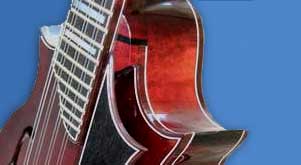« Jazzed Pentatonics |
Main
| Developing Your Voice »
 February 16, 2007 | Enharmonic Reduction February 16, 2007 | Enharmonic Reduction
Enharmonic Reduction
Remember in your early musical journeys, the first time you unraveled the fact that an A# and a Bb were the same note? An F# and a Gb? Even more confusing, an E and an Fb?
If you went on to learn some elementary music theory, it started to make sense in context. If you were playing in the key of Bb, an A# would be a fish out of water, unless it were leading somewhere (B natural), and even more advanced theory would reveal this sort of accidental "anomaly" (pun intended) was a clue that some kind of key modulation was going on.
For us, accuracies in accidentals are critical in notation. Sure, it means nothing aurally, but if you're reading music, there's no better clue to a key change than an accidental (# or b) to let you know some kind of tonal mischief is up ahead. This is critical in jazz, if you want to rapidly identify a tonal center change, and employ the mode or scale you need for improvisational fodder. You get to the point where these visual clues are quite valuable in harmonic analysis! And nothing like a courtesy accidental (in parenthesis) to tell you you're back home again from some kind of harmonic vacation.
Interesting how different musicians have a different threshold for "accuracy." Most will agree that an Fb is useful in playing in the key of Db (not E!), and occasional double sharp (F## in G# minor), but what does one do with the theoretical keys (which do happen in jazz if you're doing any sort of transposition) like Gb minor or B# major? Probably something you don't worry about often, but what if you're a software designer like Craig Schmoller who writes program code that ventures into this tricky area of practical, vs theoretical?
We recently had some dialogue over an improvement he made in his magnificently useful tool, Mando ModeExplorer (you do have your copy now, don't you?) on Enharmonic Reduction. "I don't pretend that there will be complete agreement on my rendering of these names, nor do I contend I've got it all 'right.' However, my objective is to make a note of all the multiple sharps and flats that are generated by a synthetic mode based on any tonic, and at the same time use the simplest equivalent in the chords derived from that scale...
"A straightforward example might be A# melodic minor. The notes of the scale are A# B# C# D# E# F## G##. We would not see chords names B#, E#, F## or G## in the Real Book or any charts I've seen, so these are reduced to a reasonable enharmonic equivalent. (Reasonable to me, anyway) When you mouse over the 'Component Chords' node of the scale, if there are oddballs, a Tool-tip pops up and informs you: 'Actual scale note names A#, B#, C#, D#, E#, F##, G## reduced to enharmonic equivalents in chord names.' In this case, the chords are listed as A#, C, C#, D#, F, G, and A. Given the situations that arise with synthetic scales and the reality of chord charts, it's a good compromise."
View example: Mando Mode Explorer Tool Tip
Interesting but apropos term, "Enharmonic Reduction." Glad Craig didn't call it "Enharmonic Dysfunction" or you wouldn't get "E.D." past most good spam blockers to email your friends...
Seriously, this is a cool improvement, and a great answer to this rare but significant analytical "disorder." It's also a good example of Groveland's attention to offering the best in comprehensive solutions for musicians. It's a terrific program and one you'd find most helpful in your mandolin-based music theory, mode, and chord studies.
Our review: Mando ModeExplorer
Purchasing information
Posted by Ted at February 16, 2007 6:10 AM

Disclaimer: In the 'Information Age' of the 21st Century,
any fool with a computer, a modem, and an idea can
become a self-professed 'expert." This site does not
come equipped with 'discernment.'
|



